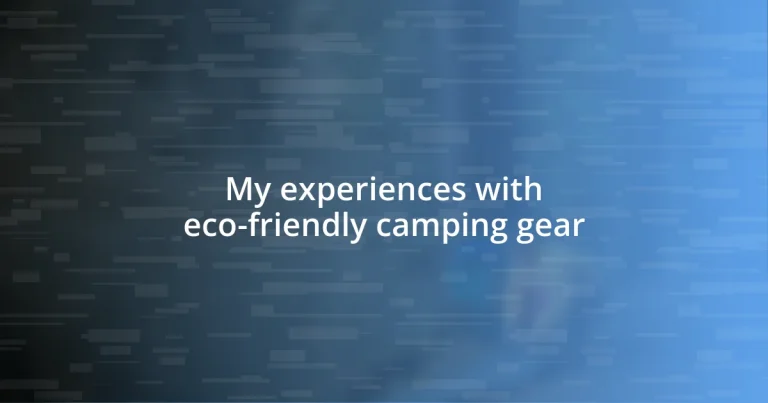Key takeaways:
- Using eco-friendly gear enhances camping experiences while reducing environmental impact, with durable products leading to long-term savings and less waste.
- Brands like Patagonia, REI Co-op, and Big Agnes stand out for their commitment to sustainability, offering high-quality, eco-conscious products.
- Key features of eco-friendly products include renewable materials, non-toxic components, durability, and ethical manufacturing practices, promoting positive environmental and social impacts.
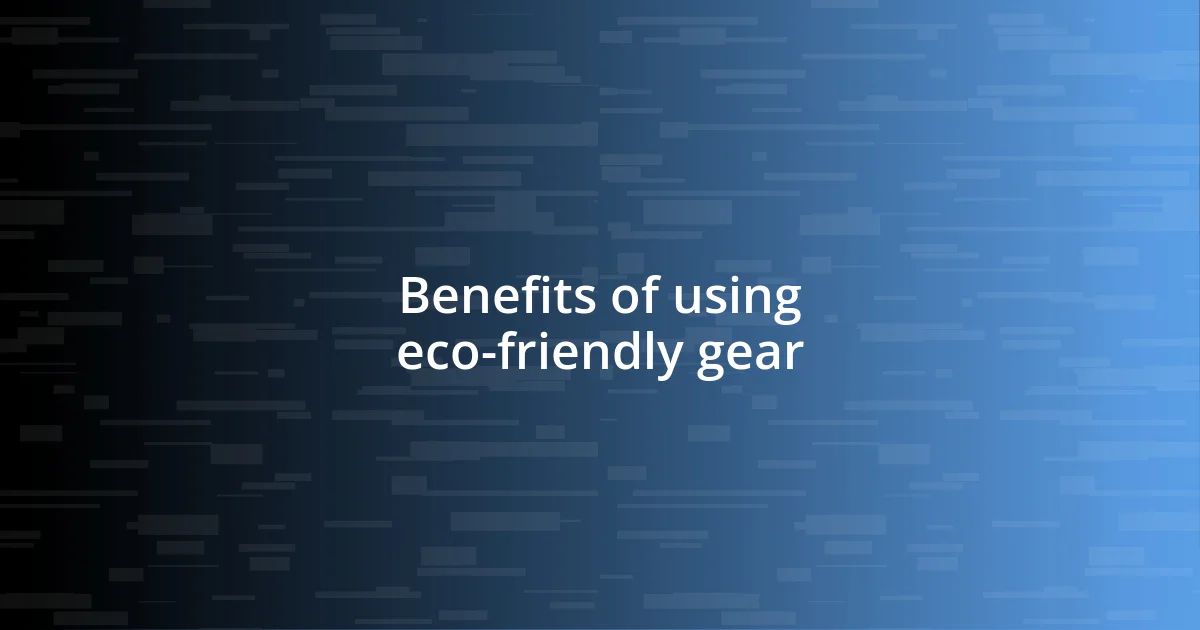
Benefits of using eco-friendly gear
Using eco-friendly gear while camping not only helps the environment but also enhances your experience in nature. I remember one trip where I brought along a bamboo cutlery set. It felt good to know that my choice was reducing plastic waste, and it added a unique touch to my meals in the wild. Have you ever felt that satisfaction of making a choice that aligns with your values?
Another benefit of eco-friendly gear is durability. Many sustainable products are designed to last longer than their conventional counterparts. For example, I invested in a high-quality recycled sleeping bag that has served me well for multiple seasons. Knowing that I’m not constantly replacing gear reduces my ecological footprint and saves me money in the long run: who wouldn’t appreciate that?
Lastly, opting for eco-friendly gear often means supporting innovative brands that prioritize sustainability. I came across a company that uses reclaimed materials to create tents. This not only adds comfort and functionality but also allows me to share a story about my gear with fellow campers, sparking conversations about environmental responsibility. Isn’t it great when your outdoor adventures become gateways to deeper discussions about nature and conservation?
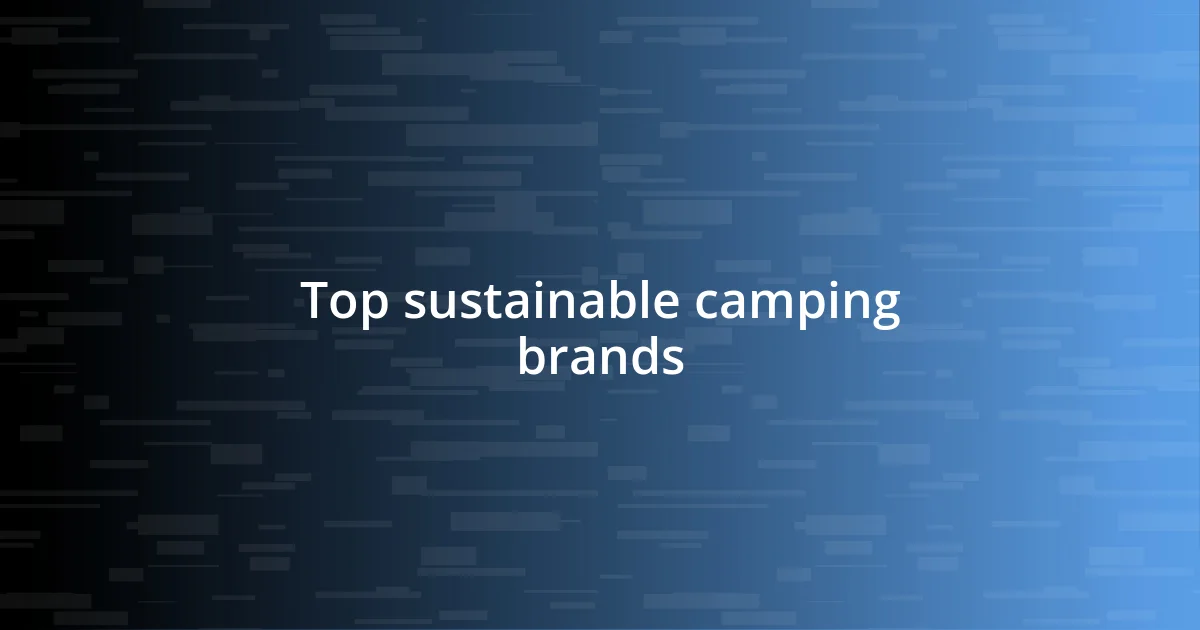
Top sustainable camping brands
When it comes to sustainable camping gear, several brands truly stand out. One of my favorites is Patagonia. Their commitment to environmental activism resonates with me, especially knowing that they donate a percentage of their profits to ecological causes. I still recall using their durable, recycled material jacket during a rainstorm on a camping trip—it kept me warm and dry while reminding me I was contributing to a greater cause.
Another brand worth mentioning is REI Co-op. They focus on accessibility and sustainability, offering a range of eco-friendly camping gear at reasonable prices. I remember when I bought my first pair of their organic cotton hiking pants; they were not only comfortable but also lasted through countless trails and adventures. This blend of affordability and environmental responsibility made me feel like I was making a smart choice for both my wallet and the planet.
Lastly, I can’t overlook Big Agnes. Their tents and sleeping bags often use recycled materials, and I’ve had some of the coziest nights under the stars in their products. The joy I felt unpacking my featherlight tent, knowing it was made with sustainable practices, truly enhanced my camping experience. Who wouldn’t want to sleep soundly knowing they’re supporting a brand that cares about the Earth?
| Brand | Key Features |
|---|---|
| Patagonia | Environmental activism, recycled materials |
| REI Co-op | Affordable, organic materials |
| Big Agnes | Lightweight gear, sustainability-driven |
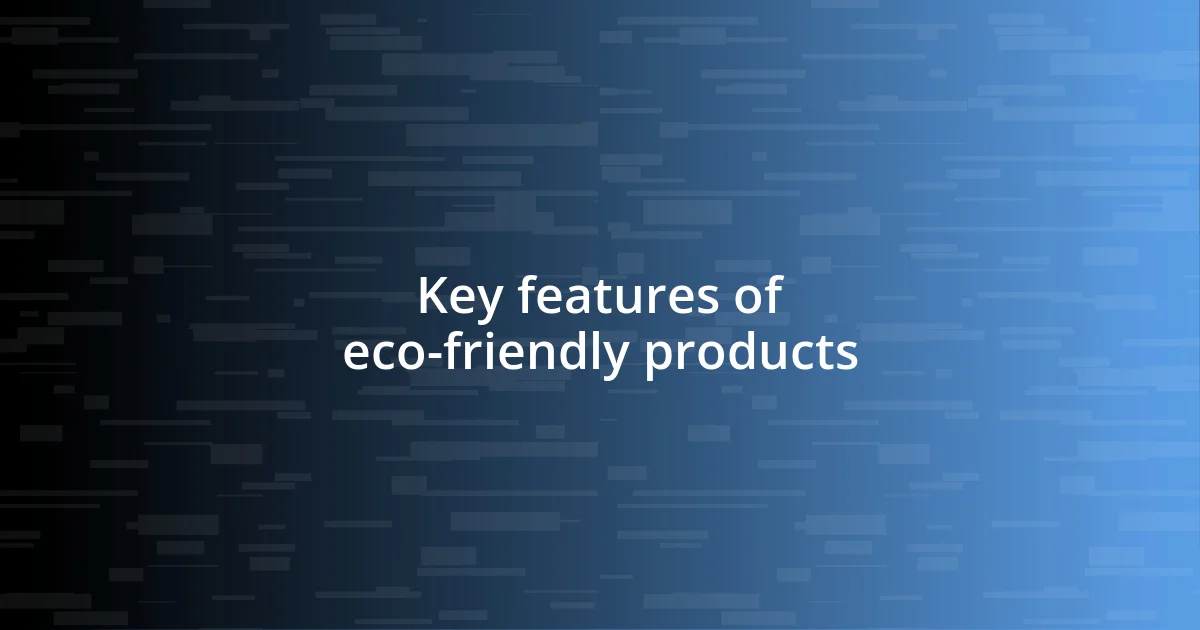
Key features of eco-friendly products
When I think about eco-friendly products, several key features come to mind. These items are not only designed with sustainability in mind but also enhance our outdoor experiences. For instance, I recently used a solar-powered lantern during a weekend camping trip. It was such a relief to know that I wasn’t draining batteries or relying on non-renewable energy sources. That simple choice made my evenings under the stars feel even more magical.
Key features of eco-friendly products often include:
- Renewable materials: Products made from bamboo, hemp, or recycled substances.
- Non-toxic components: Safe for both the user and the environment, avoiding harmful chemicals.
- Energy efficiency: Items that require less energy to power or use innovative technology to harness renewable energy.
- Durability: Longer-lasting gear, which translates to less waste over time.
- Minimal packaging: Eco-friendly products often come with reduced or biodegradable packaging.
Additionally, many brands prioritize ethical manufacturing practices. I remember buying a pair of eco-conscious hiking boots that were crafted in fair-trade factories. Knowing the artisans behind the product received fair wages made my hikes feel more meaningful. Every step I took in those boots felt supported by a commitment to both the environment and the people involved in creating them. Isn’t it incredible how our choices can create ripples of positive impact in so many areas?
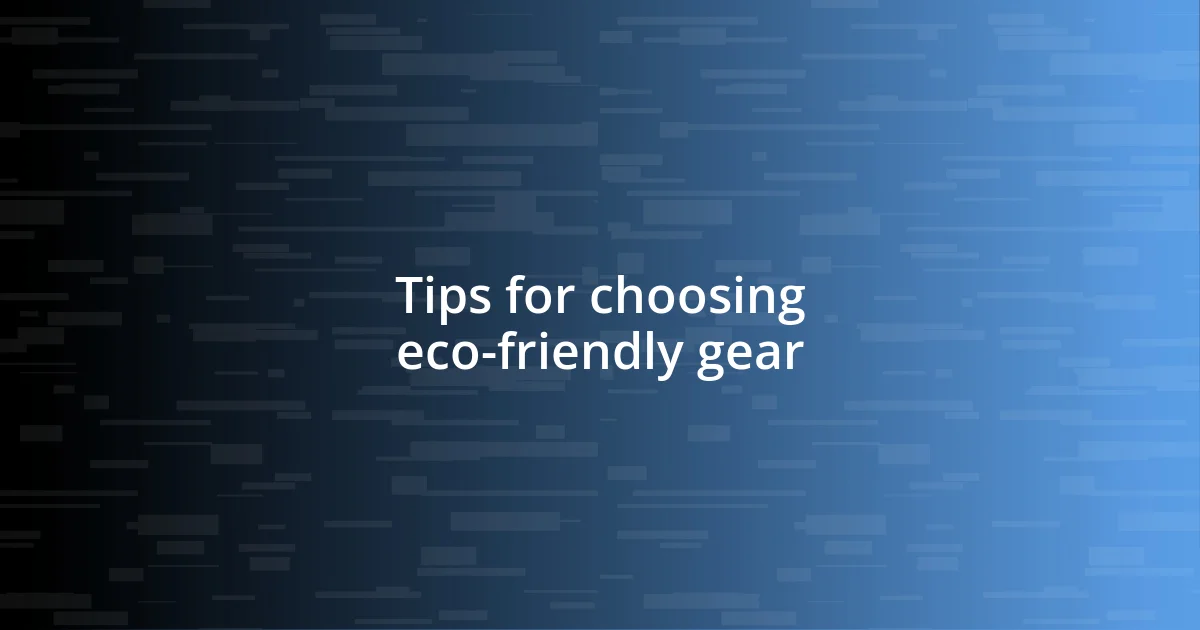
Tips for choosing eco-friendly gear
When choosing eco-friendly camping gear, I find it crucial to look for certifications like Fair Trade or the Global Organic Textile Standard (GOTS). These labels ensure that the products you buy are not only sustainable but also ethically made. I recall unboxing a water bottle with a GOTS label; holding it, I felt a sense of pride knowing it was created with human rights in mind. Isn’t it reassuring to support products that prioritize both our planet and its people?
Another tip is to consider the lifespan of the gear. I once bought a virtually indestructible backpack made from recycled materials, and after years of use, it’s still going strong! Durable gear may come with a higher price tag upfront, but it saves you money in the long run and reduces waste by not needing frequent replacements. Can you imagine the impact if everyone made choices that lasted?
Lastly, I highly recommend checking for a brand’s take-back program or repair services. I had a tent that developed a small tear after several trips, and contacting the manufacturer for repairs felt like a win-win; I wasn’t forced to toss it aside. Instead, I repaired it and continued to use it for years. Doesn’t it feel great to extend the life of your gear while reducing environmental impact?

Personal experiences with specific products
I had a unique experience with a biodegradable toilet kit during a camping trip in the woods. It may sound silly, but I felt a sense of relief knowing that I wasn’t leaving any trace behind in such a pristine environment. The kit was easy to use and, honestly, I appreciated how it respected the natural landscape. It made me realize the importance of considering even the smallest items we bring on our adventures.
One standout product has definitely been my reusable sandwich wraps. Initially, I was skeptical; I thought, “Would they really keep my food fresh?” But after using them on several outings, I’ve been pleasantly surprised. They’ve replaced plastic wrap entirely in my cooking routine. Plus, the vibrant designs always spark a conversation at meal times. Wouldn’t you agree that eco-friendly choices can also be stylish?
I also experimented with a camp stove powered by biofuel, which was a definite game changer. My first use was a bit clunky as I adjusted to the unique cooking method, but the flavor imparted to my meals was unexpected. There’s something rewarding about cooking outdoors while knowing I’m using a product that minimizes my carbon footprint. Isn’t it empowering to think that even our meals can contribute to a healthier planet?












